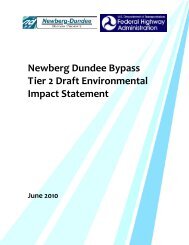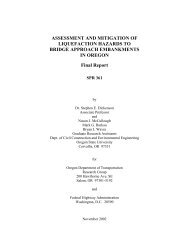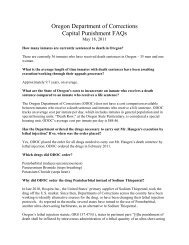Oregon Balance of State HIV/AIDS Housing & Services Systems ...
Oregon Balance of State HIV/AIDS Housing & Services Systems ...
Oregon Balance of State HIV/AIDS Housing & Services Systems ...
Create successful ePaper yourself
Turn your PDF publications into a flip-book with our unique Google optimized e-Paper software.
Executive Summary—<strong>Oregon</strong> <strong>HIV</strong>/<strong>AIDS</strong> <strong>Housing</strong> and <strong>Services</strong> <strong>Systems</strong> Integration Plan v<br />
Homeless <strong>Services</strong><br />
7. Lack <strong>of</strong> Shared Data and Coordinated Planning Between <strong>HIV</strong>/<strong>AIDS</strong> and Homeless<br />
<strong>Systems</strong><br />
Limited data is available on the overlap between the challenges <strong>of</strong> homelessness and <strong>HIV</strong>/<strong>AIDS</strong>,<br />
and information systems are not well integrated on the client or systems levels. As a result, clients<br />
risk falling through the cracks and not receiving referrals for needed services.<br />
8. Incomplete Integration <strong>of</strong> <strong>HIV</strong>/<strong>AIDS</strong> Issues into Continua <strong>of</strong> Care<br />
Steering Committee members identified the need for more meaningful inclusion <strong>of</strong> the needs <strong>of</strong><br />
people living with <strong>HIV</strong>/<strong>AIDS</strong> in Continuum <strong>of</strong> Care planning, including through participation by<br />
<strong>HIV</strong>/<strong>AIDS</strong> system stakeholders in Continuum meetings, and the pursuit <strong>of</strong> additional Shelter Plus<br />
Care projects across the state.<br />
Recommendations<br />
• Focus attention on improving coordination with planning, data, and other elements <strong>of</strong> homeless<br />
systems.<br />
• Promote Shelter Plus Care and other bonus projects through agreements to streamline or share<br />
sponsor administrative costs.<br />
• Conduct outreach and seek partnerships with landlords and property managers.<br />
Addictions and Mental Health<br />
9. Addictions and Mental Health <strong>Services</strong> Gap<br />
The Steering Committee saw a significant gap in services for addictions and mental health services<br />
among people living with <strong>HIV</strong>/<strong>AIDS</strong> in <strong>Oregon</strong>’s balance <strong>of</strong> state.<br />
10. Limited Access by People Living with <strong>HIV</strong>/<strong>AIDS</strong> to Mainstream Behavioral Health<br />
<strong>Services</strong><br />
Steering Committee members noted that limited statewide development funds to serve people with<br />
behavioral health issues and unmet housing needs have not to date supported developments wholly<br />
or partially dedicated to people living with <strong>HIV</strong>/<strong>AIDS</strong>.<br />
Recommendations<br />
• Partner with substance abuse and mental health service providers to spotlight need and seek<br />
expanded support for these services.<br />
• Build relationships with behavioral health crisis providers.<br />
Human <strong>Services</strong> and Public Assistance<br />
11. Loss and Scarcity <strong>of</strong> Funding for Human <strong>Services</strong><br />
The budgets <strong>of</strong> local agencies that provide the bulk <strong>of</strong> human services in <strong>Oregon</strong> have been hard-hit<br />
(especially in smaller, more rural counties) by the loss <strong>of</strong> timber revenues and other challenges. The<br />
number <strong>of</strong> promising “one-stop” centers in which multiple agencies coordinate their services has<br />
dwindled.

















